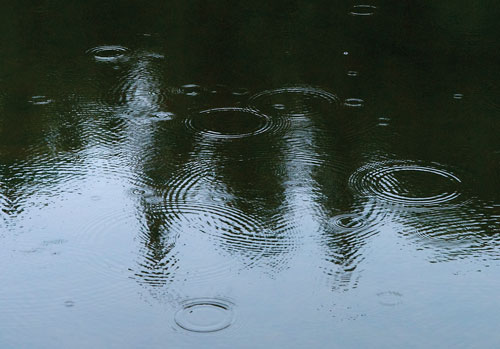I haven't seen fish in the little stream since the weekend after Father's Day. They are there, these wild trout, retreating to their secret places, much too skittish to take a fly in the thin water that remains as spring gives way to summer.
I could drive to the salt, cast heavy streamers to impossibly large fish, or make the trip to one of the tailwater fisheries, where cold-water releases from upriver dams insure quality fishing throughout the summer. Even so, there is something to be said for returning to a place week after week, month after month, year after year, something to be said for getting to know a place, its various moods, and for what can be found there, however small and insignificant it may at first appear.
With rain beginning overnight and continuing throughout the morning, rain that is steady enough to raise the level of the little brook that runs not far from our home, but not so hard as to muddy its water, I slide chest waders over a pair of shorts and tee shirt, zip up a jacket and pull the Gore-tex hood over my cap, the faded green one with the frayed brim.
The path down to the stream is spongy, my boots tramping over a lifetime of wet leaves. Like neighbors seated on their city stoops, birds trade gossip, mostly wrens and catbirds hidden amongst the wild roses, honeysuckle and barberries, the leaves of these trailside bushes heavy with moisture that splashes across my face when I brush against them. Drawing nearer to the stream I catch a glimpse of olive-and-yellow feathers flitting amongst a thicket of brambles, and then a flash of orange-and-black wings along the bank that has grown lush with summer grass, ferns and rushes. Higher up in the hardwoods, the calls of black-and-white warblers sound like rusty wheels while deep from within the forest a pewee repeats its familiar notes.
It is not only the birds that feel safe under the misty shroud. During the second week of May, I watched a fawn no bigger than a poodle wobble beside her mother, the doe stopping now and then to lick the little one that had appeared to be born no more than a few hours earlier. Now, as I enter the hemlock forest, the fawn has grown confident, twitching and twisting in exaggerated play while her mother calmly sips from the water's edge.
Rain runs over the tops of my hands, dripping down from the hemlocks and off the leaves of the hardwood trees. It drapes the lichen-covered boulders making them too slick to climb and taps against my shoulders, an occasional bigger drop falling against the brim of the olive cap with a noticeable plop.

There is always glare on the stream, even on a rainy afternoon, and sweat fogs the sunglasses that I wear to better detect the trout that can hide in plain sight. Taking a knee to wipe the glasses clear, I marvel at the rain as it strikes the pool beside me. The circular ripples created by each drop remind me of a moonlit evening in western Maine when brook trout, none larger than a man's finger, rose from the tannin-stained surface of a wilderness pond in such numbers that Trish and I stared upward wondering how rain could fall from a sky devoid of cloud.
Sliding into the stream, I'm enveloped by water, the current pressing against my calves, its sound filling my ears, the rain falling, my own perspiration. Wading through the first bend, I disturb a Great Blue Heron that rises from the shadows. As ephemeral as a moment caught by Basho, the stately bird appears to float over the stream before disappearing into the mist.
Water flows where for weeks there has been only damp cobble, runs develop in what had been slack water, pools that were sluggish have come to life. Like the birds, and the doe and her fawn, during this magical interlude fish that for weeks have been unwilling to take my fly, however well placed, feel safe to do so.
I quickly develop a rhythm, casting without thinking, as if seeing for the first time those hidden places where trout linger. My eyes focus on the edges, along the seams. Darker patches reveal subtle variations in depth, no more than a few inches, where a fish larger than its friends may be feeding. Over by the roots of that maple tree, along that undercut bank, in the shadow cast by the low-hanging branches of a rhododendron, beside a fallen limb lodged between two boulders, trout rise to my fly.
Like children let out from school for summer vacation, the fish are eager for adventure, and I lose track of their number, as many slipping the hook as requiring release. Most are no larger than six inches, a few fitting nicely in my palm while one intrepid soul measures no longer than my pinkie.
The fur and feather that once disguised the little hook at the end of my line is eventually stripped away, with only a bit of thread and tinsel remaining, and still, the trout strike at it. Knowing that as soon as the spate passes, the fish will once more retreat to their summertime hidey-holes, I continue to cast the threadbare fly. For so long as the little stream is willing to share its secrets, I will listen.